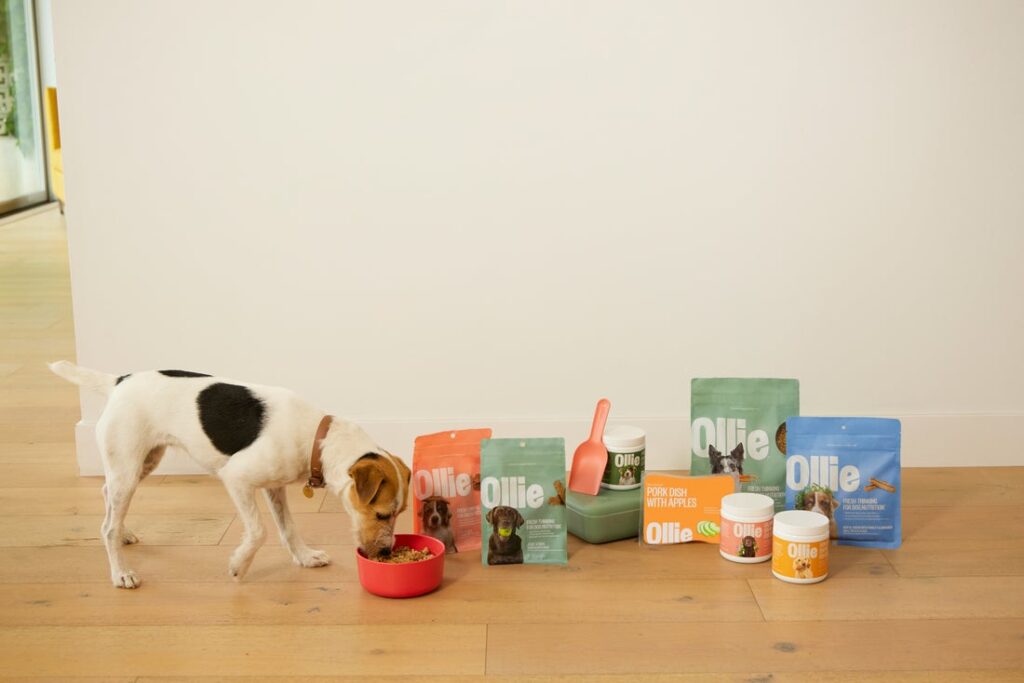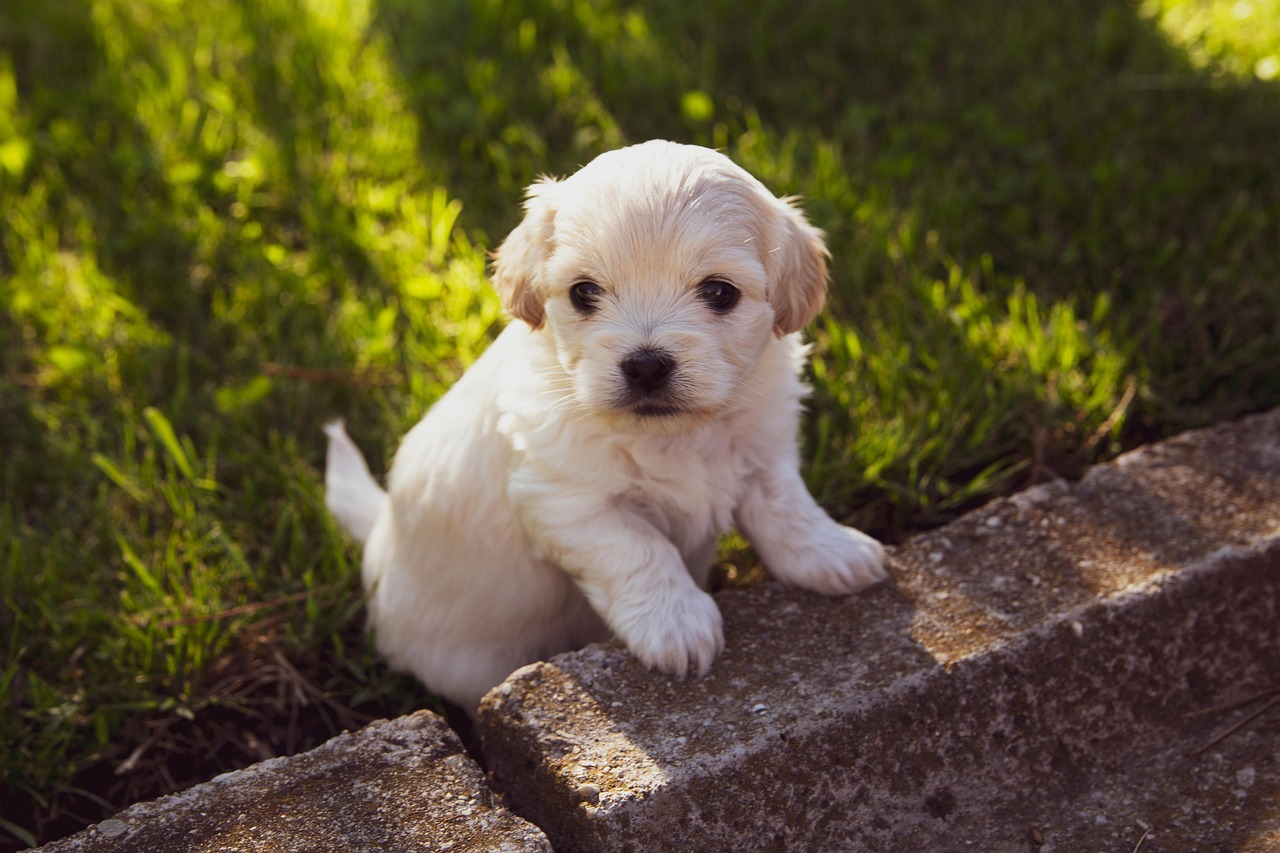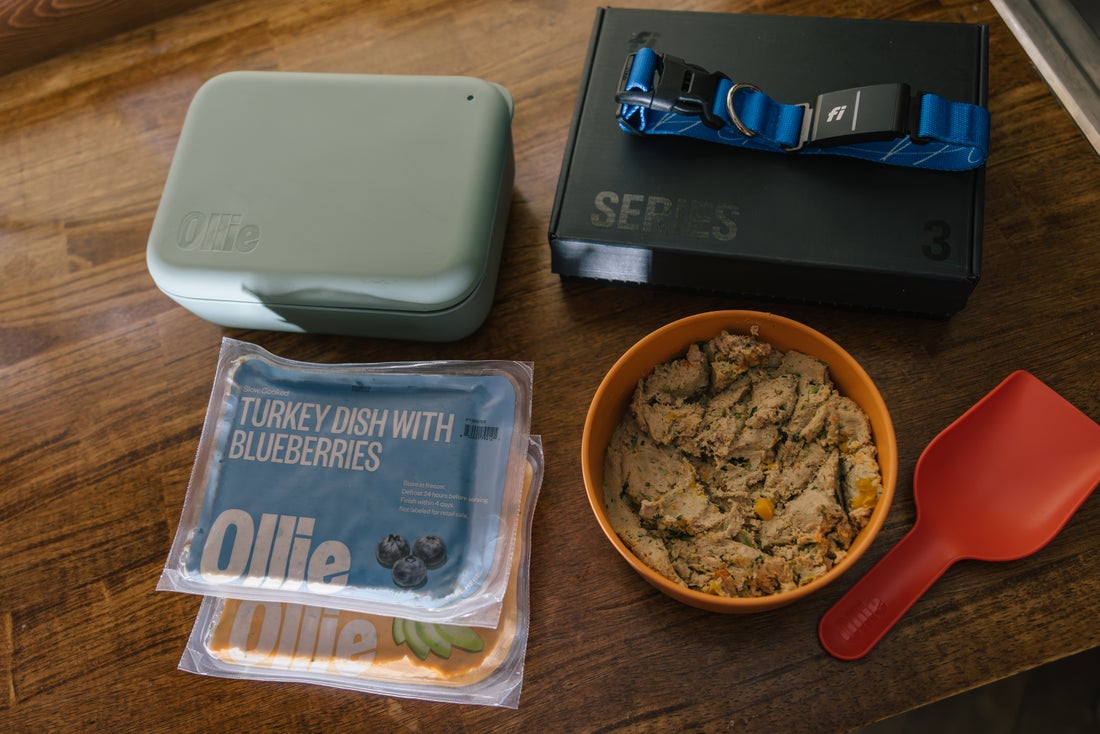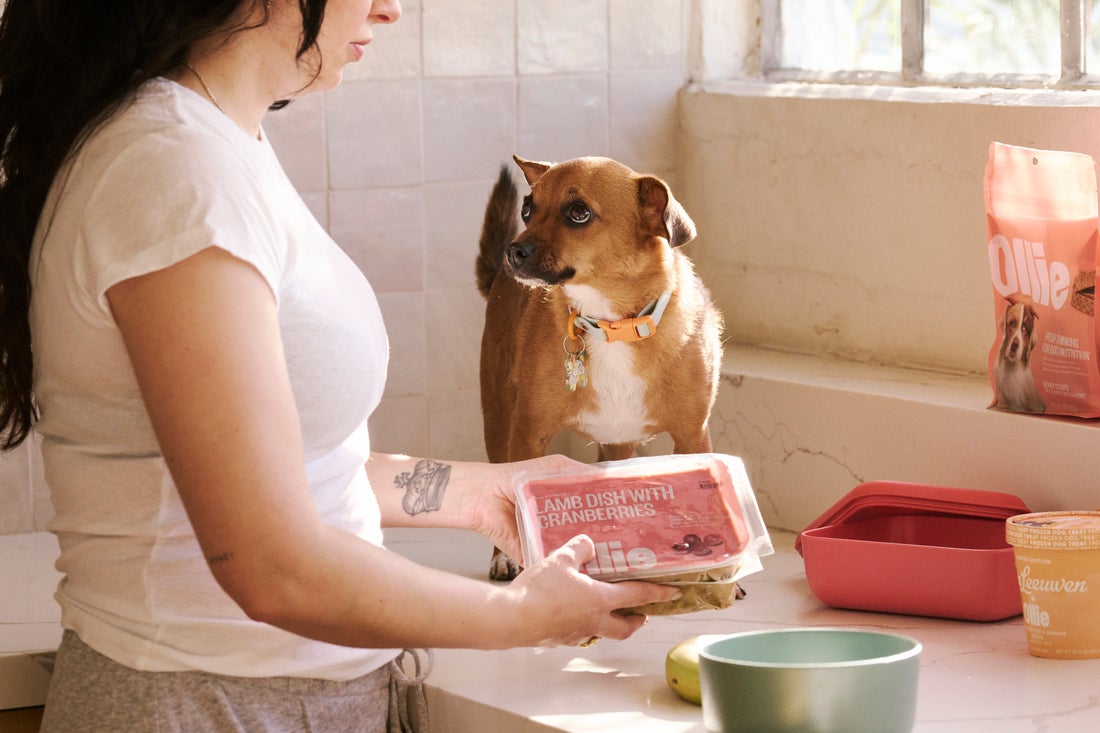Hey Ollie blog readers! We’re offering you an exclusive 60% OFF your starter box! Try now!
If you’ve ever brought home a new puppy, you probably know that surprise puddles happen — and not just from accidents on the floor. Puppy diarrhea and puppy soft stool are common, especially in those first few weeks when your pup is adjusting to new food, new places, and lots of new stress.
A little tummy trouble is usually no big deal, but it can still be messy and worrying when you see it for the first time. Many puppies get loose stools from simple things like changing food too fast, nibbling on treats they shouldn’t, or the stress of moving to a new home.
The good news is that mild puppy diarrhea often clears up with some simple steps at home — like offering plenty of fresh water, feeding a bland meal for a day or two, and making sure your puppy’s food is easy to digest. That’s one reason so many new puppy parents choose Ollie human grade dog food, they’re made with real ingredients that are easy on tiny tummies.
In this guide, you’ll learn what causes puppy diarrhea, what’s normal, what’s not, how to help your pup feel better fast, and when it’s time to call your vet to be safe.
How to Tell if Puppy Diarrhea Is Serious
Not all loose puppy poop means something scary. Sometimes it’s just a quick tummy reaction to a treat, new food, or a busy day. But it’s good to know when to relax, and when to get help fast.
What’s Usually Mild
- Puppy soft stool that lasts a day or two.
- Loose poop right after switching food too quickly.
- Diarrhea but your puppy is still playful, eating, and drinking normally.
- Small changes in poop when they sneak a treat or chew something weird.
What’s a Red Flag
Keep an eye out for signs that your puppy diarrhea might be more serious:
- Bloody or black poop: Dark, tar-like stool can signal bleeding.
- Vomiting + diarrhea together: Can dehydrate a puppy fast.
- Lethargy: If your puppy seems weak, tired, or not their normal bouncy self.
- Won’t eat or drink: Dehydration happens quickly in puppies.
- Diarrhea lasting more than 24–48 hours: Loose stools that stick around need vet attention.
If you ever feel unsure, call your vet. It’s always better to ask early, especially with very young puppies. Many pups bounce back fast with simple care, but it helps to know when to be cautious.
Why Does My Puppy Have Diarrhea? (Most Common Causes)
Puppy tummies are sensitive, so it doesn’t take much to upset them. Here are the biggest reasons your puppy might suddenly have diarrhea or soft stool, even if they’re still playful and eating.
- Stress & Big Changes
Moving to a new home, new people, new smells, it’s a lot for a puppy. Stress can upset digestion for a day or two, which is why puppy diarrhea is so common during the first week.
- Sudden Food Switch
Changing food too quickly is one of the top reasons new owners see puppy soft stool. Puppies need time to adjust, it’s best to switch foods slowly over 7–10 days if possible.
- Treats, Scraps & Sneaky Snacks
Puppies will chew anything, and that includes table scraps, garbage, or dropped snacks that can upset their stomachs fast. Too many rich treats can also lead to runny poop.
- Parasites or Worms
Roundworms, hookworms, and other parasites are really common in puppies. They’re easy to pick up from mom, littermates, or outside. Worms often cause loose stool, bloating, or poop with mucus.
- Bacterial or Viral Infections
Sometimes diarrhea is a sign of something more serious, like parvovirus or a bacterial bug. If your puppy has diarrhea and won’t eat, vomits, or seems weak, get help right away.
Once you know the cause, most mild cases clear up fast. Here’s how to help your pup feel better with safe, simple steps at home.
Puppy Diarrhea Treatment: What You Can Do at Home
Mild diarrhea doesn’t always mean an emergency. If your puppy has diarrhea but is still playful, eating, and drinking, you can often help settle their stomach with a few safe, simple steps at home.
- Keep Them Hydrated
Loose stools can dry a puppy out fast. Always make sure fresh, clean water is available. You can also offer ice cubes or a bit of low-sodium chicken broth (plain, no onion or garlic) to encourage drinking.
- Try a Bland Diet for a Day or Two
A bland meal gives your puppy’s gut a break. Many vets suggest a small serving of plain boiled chicken and plain white rice for 12–24 hours. Just be sure it’s unseasoned, no salt, butter, or oils.
- Feed Small, Frequent Meals
Instead of big meals, offer small portions every few hours. This is easier on your puppy’s belly and can help stool firm up more gently.
- Skip Treats and Extras
Hold off on rich treats, table scraps, or chews until their poop is back to normal. Too many extras can keep diarrhea hanging around.
- Use Gentle, Digestible Food
When your puppy’s ready to go back to regular meals, stick to something clean and simple. Many pet parents find that switching to Ollie fresh recipes helps keep little tummies calm — with real meat, veggies, and no weird fillers that can upset digestion.
Most mild diarrhea clears up in a day or two with rest, water, and a gentle meal plan. Next, we’ll break down what to feed a puppy with diarrhea in more detail so you feel confident about what’s safe and what’s not.

What to Feed a Puppy with Diarrhea
When your puppy’s tummy is upset, what you feed them (and what you skip) can make all the difference. A bland diet works like a reset button, it calms the gut so things can firm back up naturally.
The Bland Diet Basics
For short-term puppy diarrhea treatment, a vet may suggest:
- Plain boiled chicken — no skin, bones, or seasoning.
- Plain white rice — soft and easy to digest.
Feed small amounts every few hours instead of one big meal. This keeps your puppy’s energy up without overloading their belly. Stick to the bland diet for 24–48 hours. If poop firms up, you can start reintroducing regular food slowly. “Mix in small amounts of regular food with bland meals over 2–3 days to avoid another upset.
What to Avoid
- No greasy meats, dairy, or rich table scraps.
- Skip flavored broths that have garlic or onion — these can be harmful.
- No store-bought treats until your puppy’s poop looks normal again.
When to Switch Back
Most mild cases clear up in about 24–48 hours. Once your puppy’s poop firms up, slowly mix their regular food back in with the bland food over a few days.
Why Fresh Food Can Help Long-Term
Puppy tummies do best on real, balanced food that’s easy to digest. A fresh diet like Ollie gently cooked puppy recipes uses simple, high-quality ingredients — no mystery fillers that can sneakily upset a puppy’s belly.
Feeding real food from the start can help avoid repeat tummy troubles and keep your puppy’s poop healthy and firm.
When to Call the Vet About Puppy Diarrhea
Most puppies bounce back from mild tummy trouble pretty quickly, but sometimes diarrhea is your puppy’s way of saying, Hey, I need more help.
Here’s when you shouldn’t wait it out:
Signs You Need a Vet’s Help
- Blood in the poop: Bright red or dark, tar-like stool means there could be bleeding inside.
- Vomiting and diarrhea together: This can lead to dehydration fast.
- Won’t eat or drink: A puppy who skips meals and won’t touch water needs help right away.
- Lethargic or weak: If your playful puppy suddenly has no energy, trust your gut.
- Diarrhea lasts more than 24–48 hours: Especially for tiny puppies, long-lasting diarrhea can be risky.
- Your puppy seems in pain: Crying when pooping or a bloated belly are signs to check in.
Young Puppies Need Extra Care
Tiny pups like 8-week-olds can get dehydrated fast. If your young puppy has diarrhea, it’s smart to check in with your vet early.
Your vet may run a stool test for worms, check for infection, or help you adjust your puppy’s food. Sometimes just changing to a gentle, digestible diet, like Ollie fresh puppy recipes — can make a huge difference for repeat tummy issues.
How to Prevent Puppy Diarrhea
A runny tummy once in a while is part of puppy life, but a few smart habits can help keep your pup’s poop firm and your carpet cleaner.
Switch Foods Slowly
If you’re changing your puppy’s food, do it gradually over 7–10 days. Mix a little of the new food with the old, slowly adding more each day. Sudden switches are one of the biggest causes of puppy soft stool.
Limit Table Scraps and Treats
Puppies have sensitive stomachs. Too many new treats or sneaky bites of people food can easily upset digestion. Stick to simple, puppy-safe snacks.
Puppy-Proof Your Home
Keep trash, old food, and unsafe chewables out of reach. Puppies explore the world with their mouths — one reason why ‘why does my puppy have diarrhea?’ is such a common new-parent question.
Deworm Regularly
Most puppies get worms at some point. Follow your vet’s deworming schedule and get stool checks to catch parasites early.
Feed Real, Digestible Food
A clean, gentle diet supports a healthy gut. Many new puppy parents see fewer tummy troubles when they skip cheap kibble and switch to fresh food like Ollie gently cooked puppy recipes, made with real meat, veggies, and no weird fillers.
A little prevention goes a long way toward keeping your puppy’s belly happy and your floors accident-free. A little tummy trouble is part of puppy life, but it doesn’t have to stress you out. With the right food, a few simple steps, and quick help when needed, most pups bounce back in no time — and you’ll both feel more confident navigating the messier parts of puppyhood.
FAQs About Puppy Diarrhea
Why does my puppy have diarrhea but is still playful?
A playful puppy with loose poop usually has mild tummy trouble, maybe from a quick food change, sneaking a treat, or stress. Keep an eye on them, offer plenty of water, and feed a bland diet for a day. If diarrhea sticks around, check in with your vet.
Should I feed my puppy if they have diarrhea?
Yes, puppies need calories to stay strong. A bland meal like plain boiled chicken and rice can help settle their belly. Feed small amounts every few hours instead of one big meal.
When should I worry about puppy soft stool?
Soft stool for a day or two can be normal, especially if your puppy is happy and eating. But call your vet if there’s blood, vomiting, no appetite, or if the runs last more than two days.
What’s the best puppy diarrhea treatment at home?
Hydration first. Fresh water, maybe plain broth. Bland food like boiled chicken and rice for a day or two. Keep things calm, skip treats, and switch back to normal food slowly once poop firms up.
Can what I feed my puppy help prevent diarrhea?
Absolutely. Many new puppy parents find that cheap kibble or treats with fillers cause repeat tummy troubles. Feeding a balanced, gently cooked diet like Ollie fresh puppy recipes can help keep digestion smooth and stools healthy.
Support a Healthy Puppy Belly from the Start
Real, fresh food can make a big difference for growing pups — especially when their tummies are still adjusting to the world.
Ollie gently cooked meals are made with whole ingredients, no fillers, and plenty of gut-friendly goodness to help your pup feel their best every day (and night).
Ready for fewer messes and more tail wags? Try Ollie puppy recipes today.
Tagged As:

The nutrition your dog needs,
the food they want.

Enjoying our articles? Subscribe our Newsletters and get new articles directly to your inbox
You might also like
18 September 2025
4 MINS READ
Is Fresh Dog Food Easier to Digest?
Yes, fresh dog food is generally easier for dogs to digest than highly processed kibble. Because it’s made with whole ingredients, gently cooked, and free from unnecessary fillers, fresh food supp…
by Ollie Pets
18 September 2025
5 MINS READ
Can I Rotate Fresh Dog Food Flavors?
Yes, it’s safe to rotate fresh dog food flavors, and many dogs actually benefit from the variety. At Ollie, we offer multiple fresh recipes, like Beef, Chicken, Turkey, Lamb, and Pork so you can…
by Ollie Pets
18 September 2025
5 MINS READ
Is Fresh Dog Food Safe During Power Outages?
Fresh dog food is only safe during a power outage if it has stayed cold, specifically, below 40°F. Once the temperature rises above that point, bacteria can start to grow, and the food may no lon…
by Ollie Pets







